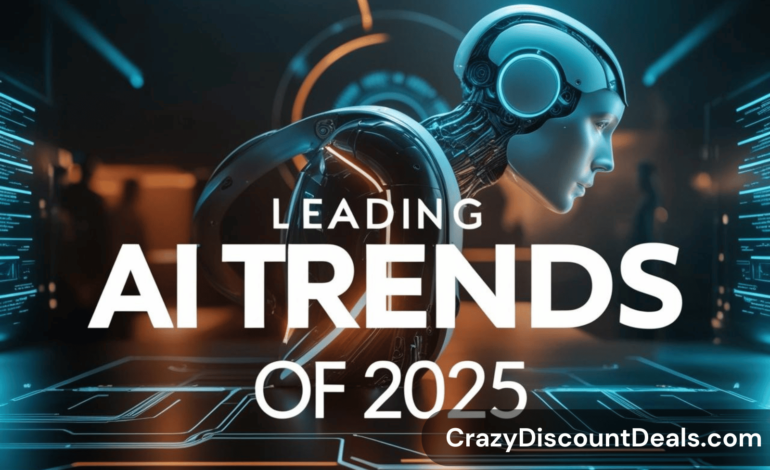Top 8 Technology Trends That Will Shape 2025

Top 8 Technology Trends That Will Shape 2025
Technology is evolving at an unprecedented pace, and 2025 is set to be a groundbreaking year. From AI advancements to quantum computing, the digital landscape is undergoing massive transformations that will impact businesses, individuals, and industries alike. Let’s dive into the top technology trends that will define the year ahead here are the top 8 Technology Trends we think will have major impact this year
1. Artificial Intelligence (AI) Becomes More Human-Like
AI is already a game-changer, but in 2025, it will become even more human-like. Thanks to advancements in Generative AI, Natural Language Processing (NLP), and multimodal AI, machines will better understand and respond to human emotions, tones, and intent.
Key AI Trends in 2025:
✔ AI-powered chatbots offering hyper-personalized interactions.
✔ Voice assistants that recognize and adapt to emotions.
✔ AI-generated content with human-level accuracy.
✔ More ethical AI models with reduced bias and improved transparency.
Businesses leveraging AI in customer service, content creation, and automation will gain a significant edge.
“The future belongs to those who embrace technology before it becomes the norm.”
2. Quantum Computing Revolution
Quantum computing is no longer science fiction; it’s becoming a reality. In 2025, tech giants like Google, IBM, and Microsoft will push the boundaries of quantum supremacy, enabling problem-solving at speeds unimaginable with classical computers.
How Quantum Computing Will Impact 2025:
✔ Breakthroughs in drug discovery and healthcare.
✔ Next-level cybersecurity encryption techniques.
✔ Faster and more efficient financial modeling.
✔ Solving complex logistics and supply chain problems.
While still in its infancy, quantum computing is set to disrupt industries in ways we can only begin to imagine.
“The pace of change is accelerating—those who master technology will master the future.”
3. The Rise of 6G and Ultra-Fast Connectivity
5G is just getting started, but 6G is already in development and is expected to make waves by 2025. With speeds up to 100 times faster than 5G, it will enable real-time data processing, ultra-low latency, and seamless connectivity.
Benefits of 6G:
✔ Instant downloads and real-time cloud computing.
✔ Seamless augmented reality (AR) and virtual reality (VR) experiences.
✔ Smarter IoT devices with near-zero lag.
✔ Enhanced AI capabilities through real-time data transmission.
Industries like healthcare, gaming, and autonomous vehicles will benefit immensely from 6G advancements.
“Innovation isn’t just about new ideas; it’s about shaping how we live, work, and connect.”
4. Blockchain Beyond Cryptocurrency
Blockchain technology is evolving beyond its cryptocurrency roots. In 2025, expect to see wider adoption in supply chain management, cybersecurity, finance, and even voting systems.
Future Applications of Blockchain:
✔ Decentralized finance (DeFi) gaining mainstream adoption.
✔ Supply chains using blockchain for transparency and fraud prevention.
✔ Governments integrating blockchain for secure digital identities.
✔ Smart contracts replacing traditional legal agreements.
Companies that embrace blockchain will benefit from enhanced security, transparency, and efficiency.
“The next big breakthrough is just one bold idea away.”
5. The Era of Hyper-Automation
Automation is evolving beyond simple robotic process automation (RPA). Hyper-automation combines AI, machine learning (ML), and robotic automation to create fully autonomous business processes.
How Hyper-Automation Will Shape 2025:
✔ AI-driven decision-making in industries like banking and healthcare.
✔ Fully automated factories with minimal human intervention.
✔ Personalized shopping experiences powered by AI.
✔ Intelligent virtual assistants managing daily tasks.
Hyper-automation will drive productivity and eliminate repetitive tasks, allowing businesses to focus on creativity and strategy.
“Tomorrow’s world is being built by today’s technology.”
6. The Evolution of the Metaverse
The metaverse is more than just a buzzword. By 2025, it will transform the way we work, socialize, and do business.
Metaverse Innovations to Watch:
✔ Virtual offices replacing traditional workspaces.
✔ Immersive e-commerce experiences with virtual try-ons.
✔ More advanced VR and AR-powered learning platforms.
✔ Digital real estate and assets becoming mainstream.
As the metaverse matures, it will reshape digital interactions and redefine economies.
“The pace of change is accelerating—those who master technology will master the future.”
7. Cybersecurity Gets Smarter
With the rise of AI and quantum computing, cybersecurity threats are becoming more sophisticated. In 2025, businesses will need AI-driven security solutions to combat emerging cyber risks.
Cybersecurity Trends in 2025:
✔ AI-powered threat detection and response.
✔ Biometric authentication replacing traditional passwords.
✔ Decentralized identity management for enhanced security.
✔ Zero-trust architecture gaining popularity.
Cybersecurity will be a top priority as businesses and governments strive to protect sensitive data from cybercriminals.
“In the digital world, security isn’t a luxury—it’s a necessity.”
8. The Sustainability Tech Boom
Sustainability is no longer optional—it’s a necessity. In 2025, green technology and sustainable innovations will be at the forefront of business and policy decisions.
Key Green Tech Trends:
✔ AI-driven energy efficiency in smart cities.
✔ Sustainable data centers powered by renewable energy.
✔ Electric vehicle (EV) advancements and autonomous driving.
✔ Carbon capture technology becoming mainstream.
Companies investing in sustainability will not only benefit the planet but also enhance brand reputation and long-term profitability.
“Greenfield technology isn’t just about starting fresh—it’s about building smarter, greener, and more sustainable futures.”
The year 2025 will be a turning point in technological evolution. From AI advancements to hyper-automation and sustainability tech, these innovations will reshape industries and everyday life. Businesses that embrace these trends early will gain a competitive advantage in the digital age.








